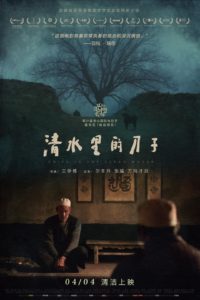Knife in the Clear Water
清水里的刀子
China, 2016, colour, 16:9, 93 mins.
Director: Wang Xuebo 王学博.
Rating: 5/10.
Rigorous but uninvolving portrait of a paterfamilias’ dilemma over sacrificing the family’s bull.
Southern Ningxia province, northwest China, the present day. Following the death and funeral of his beloved wife, elderly farmer Ma Zishan (Yang Shengcang) is in favour of a simple, and practical, ceremony to mark the end of the 40-day mourning period. However, his son, Iyer Gubai (Yang Shengcang), proposes something much more lavish – sacrificing the family’s bull. The family cannot afford to buy a new one, but the bull is already old and not fit for work, and the son wants to pay his mother due respect. Ma Zishan thinks long and hard over the decision, especially as he has developed a kind of crusty companionship with the animal over the years. The family is struggling to make ends meet. Ma Zishan’s nephew has a leg injury and has been unable to work. Between helping out herding sheep and planting potatoes, Iyer Gubai also has a job in town. And Ma Zishan’s younger brother Sejal (Yao Hailong), whose wife is about to give birth, comes by to ask his elder for rice. Ma Zishan then learns Iyer Gubai plans to spend more than RMB500 on food for the ceremony, excluding the fee for the imam. The day of the sacrifice gradually comes closer. But then the animal suddenly stops eating and drinking, making Ma Zishan wonder whether it has had a premonition of its own death and has decided to purify itself.
REVIEW
An elderly paterfamilias finds himself torn between tradition, superstition and personal feelings when asked to slaughter the family’s aged bull for a religious ceremony in Knife in the Clear Water 清水里的刀子, a precision-tooled but stylistically unoriginal directing debut by Wang Xuebo 王学博. The film is most interesting for being set among China’s Hui 回 ethnic minority, a largely Muslim group centred in the country’s northwest (especially in Ningxia province), whose people are practically indistinguishable from Han Chinese. Closely based on a 1998 short story by Ningxia writer Shi Shuqing 石舒清 (pen name of Tian Yumin 田裕民), himself Hui, Knife has an impressive intellectual rigour but no emotional content to match.
 Though it’s the second biggest of China’s ethnic minorities, the Hui have been poorly represented on the big screen during the past 60-odd years, with only a half-dozen or so features. Most of these have been war-themed, the most recent being Heart to Heart 同心 (2007), directed by He Xiaojiang 和小江; prior to that, the most notable were Sunshine over the Red-Stone Gully 太阳照亮了红石沟 (Lu Ren 鲁韧, 1953), Liupan Mountain 六盘山 (Guo Yangting 郭阳庭, Liu Bin 刘斌, 1978) and Blood Oath 血誓 (Gao Tianhong 高天虹, 1990). The Hui’s less exotic and colorful culture, and location in often very poor regions, may account for their relative neglect by film-makers.
Though it’s the second biggest of China’s ethnic minorities, the Hui have been poorly represented on the big screen during the past 60-odd years, with only a half-dozen or so features. Most of these have been war-themed, the most recent being Heart to Heart 同心 (2007), directed by He Xiaojiang 和小江; prior to that, the most notable were Sunshine over the Red-Stone Gully 太阳照亮了红石沟 (Lu Ren 鲁韧, 1953), Liupan Mountain 六盘山 (Guo Yangting 郭阳庭, Liu Bin 刘斌, 1978) and Blood Oath 血誓 (Gao Tianhong 高天虹, 1990). The Hui’s less exotic and colorful culture, and location in often very poor regions, may account for their relative neglect by film-makers.
On the plus side, Wang, a Han Chinese in his early 30s whose previous production experience includes working on Tharlo ཐར་ལོ | 塔洛 (2015) by China-born Tibetan director Pema Tseden 万玛才旦, hasn’t drenched the film in ethnic or religious content: this is the story of a peasant family that just happens to be Muslim, with the same financial pressures as anybody else. And with its non-professional cast, sparse dialogue and focus on often inexpressive faces, the film largely lets the audience decide what the characters are feeling.
On the minus side, Wang draws from the usual arty toolkit of peasant characters against bare but stunning landscapes; taciturn exchanges of dialogue; little explanation of who is who; and a deliberate absence of music (until the end credits). A touching scene between the paterfamilias and his younger brother who comes proudly begging for food stands out for its character interplay and simple humanity, and the film would have benefited from more of the same. Despite a screenplay that’s credited to four writers, including Wang, the thin dramatic content doesn’t justify the film’s length: as a 45-minute, more impressionistic short, Knife would have been much more powerful.
Though it’s handled in an unsentimental way, the emotional attachment by the father to the aged bull is never convincingly explained, especially for a hard-bitten, bottom-line peasant: the viewer can understand his dilemma on an intellectual level but not really be moved by it, especially as the film also has no trace of irony. Ditto the father’s lack of any comeback when challenged by his son and others. Within the limitations of the script and direction, performances are fine, and the sharp, clear photography by Wang Weihua 王维华 is standout, especially in interiors. Listed among the producers is a trio of name directors: China’s Pema Tseden and Zhang Meng 张猛, plus Hong Kong’s Er Dongsheng 尔冬升 [Derek Yee].
In fairness to the tiny and little-known province of Ningxia – used almost exclusively by film-makers for its dusty, deserty landscapes – the concept of noble, toiling peasants in a hard-scrabble landscape is something of an arty construct. In the notoriously inhospitable region in southern Ningxia where Knife was shot, known as Xihaigu 西海固, extensive relocation programmes have been undertaken by the authorities, as no one in their right mind actually wants to live there, however photogenic it may be.
CREDITS
Presented by Ocean & Time Culture Communication (CN), Zhejiang Jiashang Film & Media (CN), Xinhuanet Sichuan Branch (CN), Ningxia Mingdao Culture Development (CN), Beijing Bolaa Advertisement Media (CN), Blackfin (Beijing) Culture & Media (CN). Produced by Blackfin (Beijing) Culture & Media (CN).
Script: Shi Shuqing, Wang Xuebo, Ma Jinlian, Ma Yue. Short story: Shi Shiqing. Photography: Wang Weihua. Editing: Guo Xiaodong, Liao Qingsong, Wang Xuebo. Music: none. Art direction: Yang Wei. Sound: Zhang Li, Fu Kang.
Cast: Yang Shengcang [from Mawan village] (Ma Zishan, father), Yang Shengcang [from Xinzhuang village] (Iyer Gubai/Yakub, son), Zhou Jinhua (son’s wife), Yang Fan (Gaxi/Qasim, grandson), Yang Xue (Fatumai/Fatima, granddaughter), Ma Zhilin (Old Wang), Li Chengyou (imam), Yang Dong (youngest grandson), Zhou Jinlan (eldest daughter), Yao Hailong (Sejal), Li Chenghua (Sejal’s wife), Wang Jie (mayor), Mi Ying (mayor’s wife).
Premiere: Busan Film Festival (New Currents), 7 Oct 2016.
Release: China, 4 Apr 2018.
